Gillon McLachlan and the phone call that decided the future of the 2020 season
The AFL season had only just kicked off when Victoria’s second coronavirus wave began. After battling to get games started AFL CEO Gillon McLachlan feared the season was on the ‘edge of an abyss’ with one phone call to decide its fate.
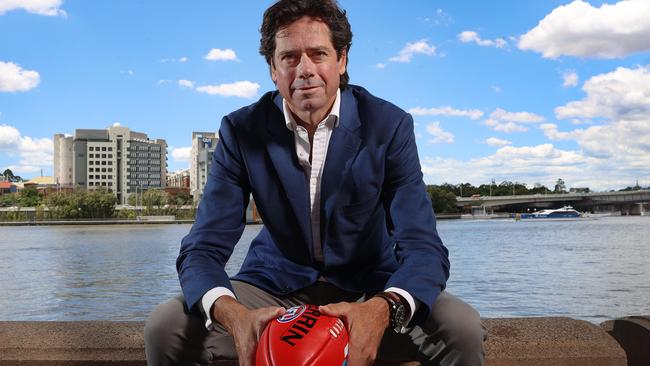
Lifestyle
Don't miss out on the headlines from Lifestyle. Followed categories will be added to My News.
IT’S the game that almost never was, and AFL chief executive Gillon McLachlan still shies from describing tonight’s grand final as a sure thing.
On Tuesday this week, McLachlan admitted to fatigue. He sounded raspy, as if he had pulled an all-nighter before an exam, and described the blur of 2020 like the fragments of a dream.
For seven months McLachlan has brokered, up-ended and relocated the game to comply with the demands of COVID-19.
As Richmond chief executive Brendon Gale says: “It really has been an elongated crisis environment, if you talk about crisis as being absolute uncertainty. Things have been changing by the day so to get through, to get to a grand final, putting health and welfare first, without any infections among our AFL community, has been remarkable.”
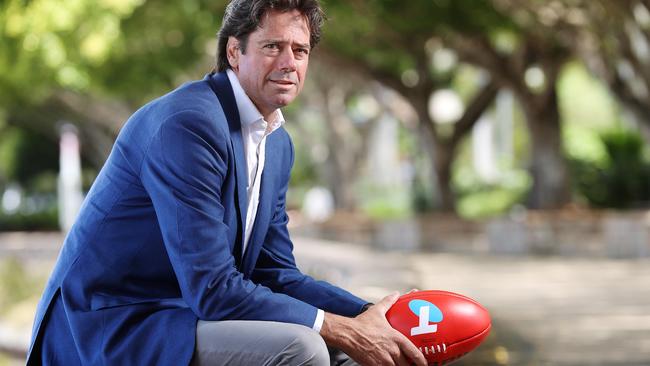
McLachlan thought his grand final aspiration may be over in March, when the season was halted and “the ship was sinking”. And in July when renewed restrictions and case numbers steered the season toward another iceberg. Unlike the Titanic, McLachlan was working without a compass.
He plans to have a punt today, like most Saturdays. He has a hot tip in the Cox Plate. He will also be counting down the hours until 7.30pm, when the two best teams of the season will meet, in what he describes as a much-needed treat for Victorians.
McLachlan has avoided media interviews in recent weeks, as if celebrating the prize of the grand final could jinx its going ahead. He’s half joking when he says he refuses to assume that the game will go ahead.
“I think early on we just knew that we couldn’t take anything for granted,” McLachlan says. “And I think there’s been a discipline, generally, with the odd exception, a discipline across our clubs and our players and my team that everyone accepts that we couldn’t take anything for granted. I think that will mean that we can really only relax and know we’re there when the ball is bounced on Saturday.”
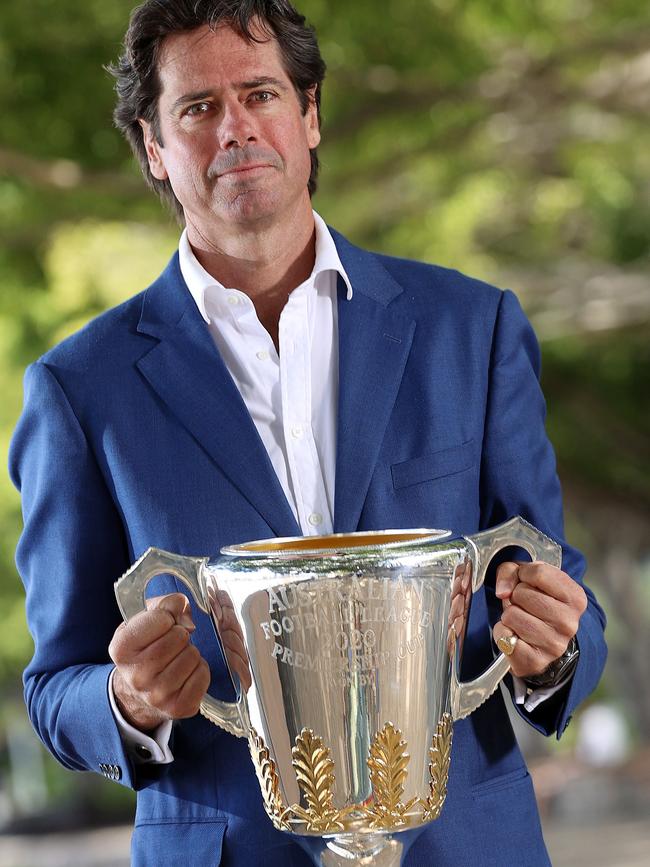
From a never-ending procession of meetings — with banks, TV executives, club presidents, sponsors, player advocates, health ministers and health officers — McLachlan brokered and bartered in talks that changed lives and livelihoods.
He got too close “to the flame”, he says, in describing himself as a “fanatic Googler”. His hunger for pandemic information, here and overseas, drove his decision-making. He sought paths when the nature of the virus, and its implications, kept twisting. He prepared for every worst case scenario, and it strikes him that so many of those models had to be enacted.
In the end, the entire season hung on a moment. Had a single conversation gone the other way, if Queensland premier Annastacia Palaszczuk had said no, McLachlan believes there might have been no 2020 grand final.
It was mid-July. A few days earlier, McLachlan rang federal Health Minister Greg Hunt, who recalls the chat well. On a rare outing with his family, he was walking at Point Nepean.
Back in March, Hunt and then chief medical officer Professor Brendan Murphy had briefed the clubs that it was safe and appropriate to start the season. Football, as Hunt now says, offered hope and a sense of normality.
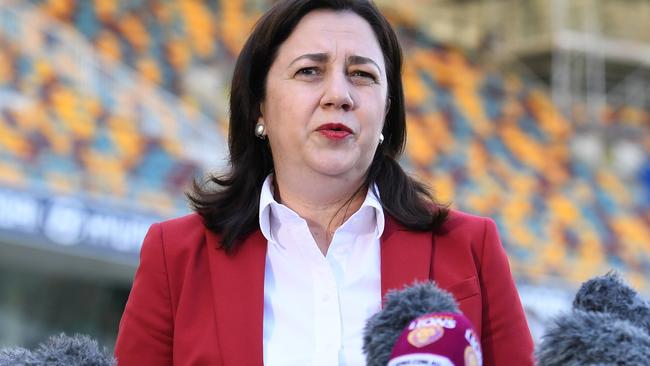
Then, the challenges multiplied in the rise of Victoria’s second wave.
“I remember providing the advice that when you looked two or three weeks ahead, at Victoria, they were unlikely to allow games in Victoria,” Hunt says. “We still didn’t have confidence in the Victorian contact tracing … we could see Victoria just wasn’t getting a handle. I advised that they should take their teams out of Victoria.”
The season teetered, as McLachlan calls it, on the “edge of an abyss”.
South Australia was closing its Victorian border, as was NSW. If players could get out of Victoria, the question remained of whether their families could follow.
Queensland loomed as the only chance of finishing the season. McLachlan spoke to Queensland Tourism Minister Kate Jones, who walked into Palasczcuk’s office and handed over the phone.
McLachlan gave a 30-second spiel about moving the game 1800km north.
“Yep, we’ll do it,” Palaszczuk replied.
Palaszczuk wanted to announce the hub arrangements at once. McLachlan didn’t have time to tell the clubs first.
“He had them out of Victoria within 48 to 72 hours,” Hunt says. “If he hadn’t grabbed that window at that time, they wouldn’t have
made it.”
A fierce mindset drove McLachlan through the 18-hour days. When he was appointed AFL chief executive in 2014, he explained how you can control some things. Other things you cannot.
There’s comfort in this approach: to do all you can, and to accept the result, good or bad, in the knowledge you could do no more.
For six months, he lived a quarantined life, staying at home in Prahran, except for necessary outings, such as lone press conferences.
He has continued his COVID-19 regimen in Queensland, where he expressed wonder when he went to a restaurant and still declines to shake hands, instead opting for an elbow bump.
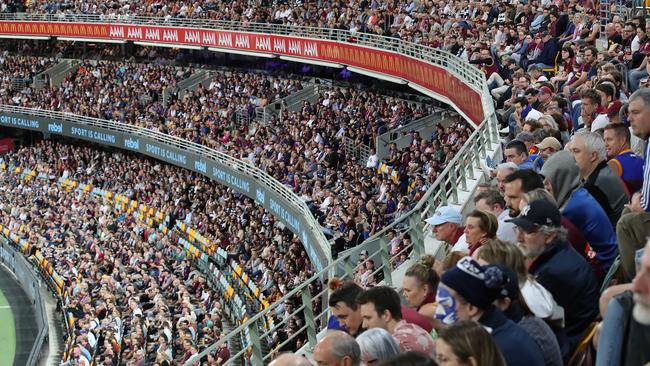
“Relentless” describes the pace and fluidity of the AFL challenges. It also applies to the AFL response. McLachlan was faced with once unthinkable dilemmas. Major cuts to the length of games and where they were played would ordinarily have inspired weeks of shrill commentary. But the pivotal moments kept coming, one after the other.
Younger brother, Hamish, once likened McLachlan to an old-time racehorse that would run twice in one day and four times during Cup Week. “He has an unbelievable capacity,” he said.
This quality was first tested in the COVID-19 environment on March 10. Victoria’s Sports Minister Martin Pakula rang McLachlan, who was in between meetings with the AFL board and the club presidents. The news was bad: AFL matches, to begin with round one the following week, would be without crowds.
McLachlan tinkered with his season launch speech, to be delivered on the same crazy day, to emphasise that the AFL would work through the challenges.
Three big decisions arose in coming days: to reduce the season to 17 rounds, whether to play the first round at all, and to then abandon matches before the first round was completed.
Choosing to go ahead was controversial. The decision was announced minutes after it was reached, after McLachlan had considered two possible media releases: one to play and one to stop.
“I think we made the call on the Wednesday, the decision to push ahead with the opening round, and that was the hardest of the three decisions in that couple of weeks,” he says.
“We had a great buy in from presidents and the commission, and we established the war council then. That was a difficult decision which I think in the end was the right one, but heavily contested.
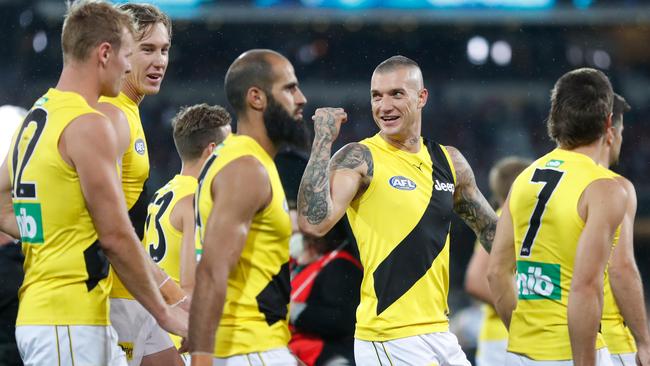
“The one to stop playing as well, which happened fast on the Sunday morning, I think at the time the public thought it was more contentious to stop. I think for me that was the easiest of the three (decisions)”.
The AFL faced $1 billion costs and no revenue. The very survival of clubs was jeopardised. McLachlan’s first priority was to talk to the banks about a line of credit. “I essentially got liquidity into our balance sheet, we renegotiated our player deals, our club funding arrangements and shored up all of the clubs and then that led to renegotiating all our broadcast agreements and sponsorship agreements.
“The analogy I use is stopping the ship from sinking. We had to get it going again.”
The pause on play threw up myriad problems. The AFL stood down 80 per cent of its staff. Players took pay cuts. Telling clubs to trim their football departments to 25 was tough, as it was a few months later, in August, when McLachlan cut one in five AFL staffers.
By May, the AFL was planning to inspect the homes of every player to ensure that flatmates did not pose an infection risk. Such reach and oversight, like the larger Melbourne lockdown, would once have been treated as absurdly intrusive.
Hub discussions became heated in June, when challenging scenarios were offered as solutions to the restrictions on play.
Players baulked at 20 weeks away from home, separated from loved ones, and McLachlan described the communications as a “glitch”.
On June 20, the worst news landed. Essendon player Conor McKenna had tested positive. How long had he had it? Had he spread the virus across clubs? The implications were season ending.
Within four hours, McLachlan had postponed the following day’s Essendon clash against Melbourne. “There was so much going on,” he says. “It was just another decision. We felt we had prepared for that eventuality, the nervous part was how our protocols were going to stand up at the club level.”
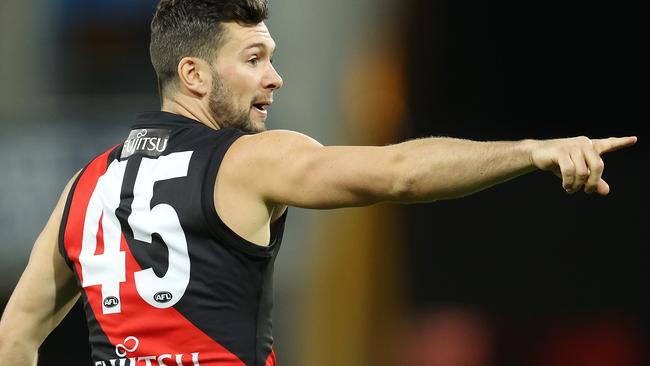
The drama proved a false alarm. McLachlan now recalls the positive as a positive. Essendon club protocols had been applied. Further tests showed McKenna probably picked up the virus in Ireland and had not been infectious.
Subsequent breaches of AFL quarantine requirements, by players and families, plainly frustrated McLachlan, especially in his heated reaction to scenes of quarantining AFL folk around a hotel pool.
But he speaks of individual failings as exceptions. His take away is that so many people, and clubs, conformed to the unnatural demands — and maddening protocols — of isolation.
McLACHLAN will take three or four days off next week. He has worked much of the year through computer hook-ups, and he describes the release of daily jogging, despite wonky knees, as an unlikely benefit.
He looks forward to his four kids returning to school, describing home schooling as “brutal”.
He will then return to work, to assess the uncertainties (including an estimated
$400 million loss of AFL revenue) and plot paths for the season ahead.
“Whatever happens, we’ll get through,” he says. “That’s the thing about this year. We see the glory of our game, the tribalism and the connection of our supporters, and we see it more than ever this year. I think it’s amazing.”
The grand final itself? McLachlan doesn’t know who will win. But he feels the fans will receive the contest they deserve.
“We’ll look back and think it was a hell of a thing to get done,” he says.
patrick.carlyon@news.com.au
MORE NEWS:
SACKED: BEAMS REVEALS EXTENT OF CRIPPLING ADDICTIONS
EVERY GRAND FINAL PLAYER RANKED
DOWNLOAD YOUR TIGERS & CATS SUPPORTER PACKS
Originally published as Gillon McLachlan and the phone call that decided the future of the 2020 season

